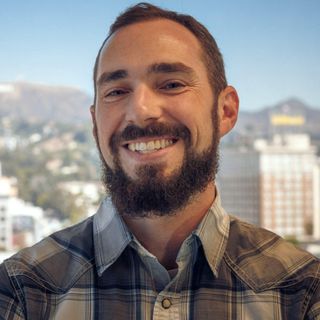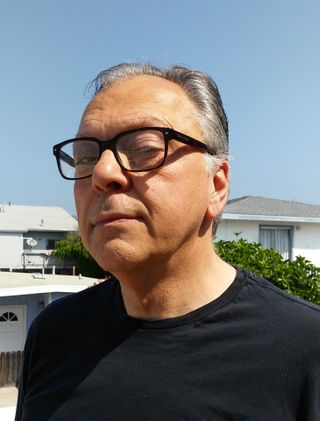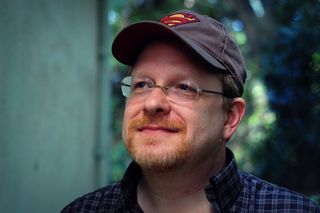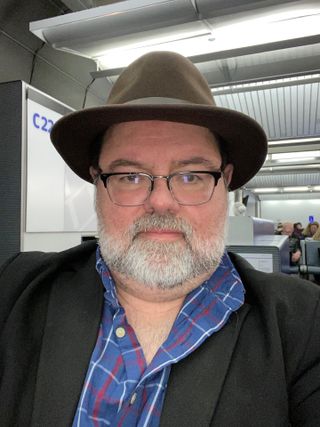They're in the credits every month, but they rarely get accolades. Fans often blame them for things they don't like, without understanding their role. And creators will tell you a good one is worth their weight in gold.
But just what do comic book editors do anyhow?
"The descriptive I use when talking to our younger editors or people, in general, is that being the editor is like being the coach or manager of a sports team," says Tom Brevoort, SVP and Executive Editor at Marvel Comics. "I don't go on the field and play the game, but I get to decide who does. I can call a particular play, bring in a pinch-hitter, and ultimately it's my job to make sure that everyone gets to the game ready to play every month."
It's a nice analogy, to start. Mark Waid, a longtime writer and editor who's also currently the publisher at Humanoids, adds more nuance.
"To my mind, the editor's job is to help you tell your story in the best way possible," Waid says. "What I need is an editor who's going to tell me, ‘This is not on the spine,' or ‘You're not landing this beat.' A good editor will do that, and a good editor will not tell me, ‘Put in a scene with a dog,' that stupid shit."
There's another huge distinction to be made in "what editors do," largely dealing with just who the editor works for.
"Mainstream superheroes are different than indie books or Image books," says Rob Levin, an experienced editor who's taken tours through Top Cow, DC, and Humanoids, plus multiple freelance gigs along the way. "When you're working on established intellectual property, there's an expectation of who the characters are, where the universe is headed, and so on. When you work on an independent book, it's more creative."
Levin is currently the Executive Editor at Valiant Comics, where - another truism - editors, as always, have to wear many hats.

"Sometimes you're a springboard, sometimes you're a shepherd," he says. "You're giving story notes, art notes, maintaining continuity, managing what you need the project to be. You're there to be the glue that holds everything together, and keeps the trains running on time."
And when a creator finds the glue he likes, he sticks to it as well. Just witness Jonathan Hickman, who along with a small field of artists, is creating a new line of books via Substack with 3 Worlds / 3 Moons. He's hired a former Marvel editor, Steve Wacker, to keep his trains running.
"We need adult supervision and by that, I mean we need logistical support as creative people," Hickman says. "I'm pretty organized, but I am incapable of handling all the logistical stuff myself simply because there are only so many hours in the day."
Wacker is there to take on the burden of logistics and lean in on the creative as well.
"Steve is also very strong, story-wise, and that's the real benefit of having someone like him around," Hickman says. "He can do all the things I'm deficient at, and on top of that, take the thing that you're already good at and make it better."
Howard Chaykin has a personal editor as well, who rides on his creator-owned projects, and who goes by the abbreviated nom de edit of Thomas K.
"I always feel that I need to have someone present to question my first instinct," Chaykin says. "I have a great deal of confidence and faith in myself as both a writer and an artist, but like everyone else, I have the need to be accountable."

Chaykin has been working with Thomas since he did Black Kiss 2 in 2012, and with the relationship a decade and counting…. Yeah, he's happy with the way it's working out.
"Thomas is a very astute reader," Chaykin says. "I often say that every idea he has costs me time and money, but at least 75 percent of those ideas are worth acting on. It's the perfect relationship for me."
And Chaykin, himself now a veteran of 50 years in the comics biz, knows the relationship is different when he's working for the man, rather than being the man. He likens working for Marvel or DC to working on a TV series, as one of the primary functions is to serve the pre-existing material.
"The note that I constantly got from editors was, 'You need to show them using their powers more,'" he says. "And that note is perfectly in line with how I think and act because the least interesting thing to me about comic books is guys with rays coming out of their eyes. But it's an important maintenance factor to the characters. My belief system is that once you take the king's coin, you are there to do his job. It is a client relationship to me. And the editor's job is not to be your friend or your colleague, but to be the conduit from you to that corporation, for better or for worse."
This is not to say, by any stretch, that an editor-creator relationship is adversarial by nature. Quite the contrary.
"Like so many things in this business, it's a symbiotic relationship," says Tom Brevoort. "When you're the editor, you're both the face of the company in dealing with the creators, and the advocate of the creators in dealing with the company."
Brevoort underlines one advocacy in particular.
"I tell our younger editors that the most important thing they do every week is make sure the guys get paid," he says. "It's very easy in the crush of doing the 10 million things that everybody has to do to lose sight of the fact that this is not just filling out a spreadsheet. It's somebody's mortgage or food."
Once you get paid…yeah, talent likes to have an advocate.
"What I'm looking for in an editor at a Marvel or DC is someone who will fight for you inside the company; fight for your ideas," says Jonathan Hickman. But Hickman also sees the other side of the coin.
"You have to understand that at a Marvel or DC, your editor is part of a giant hierarchy with its own rules. You want them to fight for you, but you've got to recognize their role and make it easy for them. They're not going to fight for you unless you've been there for them as well. And it's tough for them! Every editor I've worked for at Marvel has, like, 30 creative people they're dealing with at any time. It can be a bit like triage."

Mark Waid, who's also the de facto editor at Humanoids ("I'm the only person here who knows how to proofread!" he says) well knows the give-and-take.
"As an editor, you have to be able to explain why something bothers you, and be able, ideally, to give an alternative," he says. "At the least, be flexible in finding a solution. The bad editors are the ones who go ‘this doesn't work,' period, end of sentence. That tells me nothing."
And Waid, who's worn an editor's hat dating back to DC Comics in 1987, knows editors have to be flexible, as well.
"You pick your battles," he says. "An editor who wants to die on every hill is just an idiot. Not only will you make the creator crazy, you'll be there until midnight every night if you choose to die on all the hills."
It should come as no surprise that Rob Levin is well familiar with Waid, and the pair have worked together.
"Adaptability is an editor's key attribute," Levin says. "Every book is different; every creator is different. The results you get are going to vary wildly. You can't be the inflexible stick in the mud. You have to look at this as ‘How do I get the best work out of everyone?'"
And "everyone" includes artists (and much more on that later).
"You don't need to have a degree in illustration, but you should be able to articulate to an artist why this particular image didn't convey the story," Waid says. He digs back to a longtime 1950s-1970s DC editor as a ready example.
"Julie Schwartz had, in retrospect, what I believe was the right attitude," Waid says. "When it came to art…he didn't know art. But he knew when an arm didn't look right to him, and if it didn't look right to him, it wasn't going to look right to a bunch of 12-year-olds putting down their 25 cents. In that case, something's gotta be done."
So who does get it done? Archie Goodwin, an editor at Warren Publications, Marvel, and DC from the 1960s through the 1990s, is frequently cited by many, including many quoted here, as an exemplary editor. Goodwin was an outstanding writer who could also draw a bit, and a quiet, calming, reassuring, "we'll get it done" presence. In the here and now?
"Tom Brevoort, full stop," Waid says. "Tom is the best editor in comics. Paul Kaminski at DC will be mad at me because I didn't mention him first, but he's second on the list. But Brevoort. Brevoort has seen everything, knows art because he studied art in school, and he's always learning, and more importantly, is always willing to learn, to listen. Brevoort is the most valuable man at Marvel, whether they know it or not."
Brevoort himself points to a current Marvel editor and one ex-.
"In terms of having good instincts for knowing what creators went best with what stories and what characters, and developing stuff and being the advocate and getting great work out of people…Will Moss and Steve Wacker. These guys are good."
The problem in 2022 is finding and developing new great editors…is tough.
"The grind is severe," Waid says. "Editors used to be able to teach assistants and associates. But everything is so frenetic now that the assistants and associates learn by osmosis, and we all hope to pull some skills from that. But it's not the same as being able to in-house mentor someone. The grind and turnover is so swift that you now have new editors learning from assistants and associates who never got the full ‘education' themselves and are passing along an incomplete package of knowledge."

Brevoort is trying to blunt that edge as much as possible. He hosts regular "reading circles" with junior Marvel editors, dissecting and discussing both current and past Marvel books, calling out editorial choices and trying to pass along knowledge today that can work for tomorrow. It's part of what Brevoort sees as a larger mission.
"The one word that describes this is ‘responsible,'" he says. "The editor is responsible for everything, good and bad, and they must be responsible in their dealings with everybody—the creators, the company, all this stuff."
And Jonathan Hickman reminds us that the creator-editor relationship is indeed a two-way street.
"I tell this to new writers all the time: If you want job security, don't have a painful relationship with your editor," he says. "You've got to, got to, make their life easy. Don't be a headache. Because at some point, no talent is worth it. It may take years, but at some point, if your bullshit is too much, you're out the door."
An oral history of Carol Kalish: the most important comic book figure you've never heard of.

